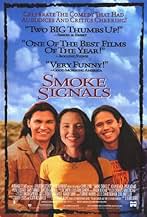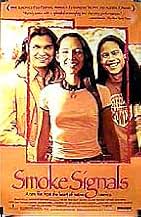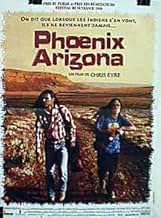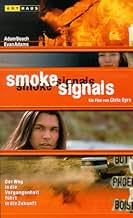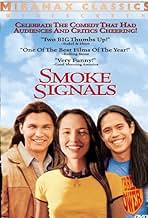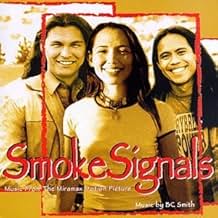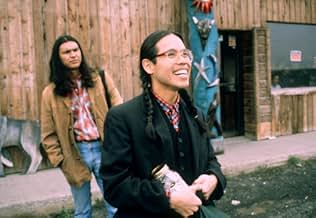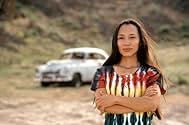Le 4 juillet 1988, le jour de la fête d'indépendance des Blancs, après une nuit de beuverie, Arnold Joseph monte dans sa camionnette jaune et disparaît à jamais, laissant derrière lui sa fem... Tout lireLe 4 juillet 1988, le jour de la fête d'indépendance des Blancs, après une nuit de beuverie, Arnold Joseph monte dans sa camionnette jaune et disparaît à jamais, laissant derrière lui sa femme Arlene et son fils Victor, alors âgé de 12 ansLe 4 juillet 1988, le jour de la fête d'indépendance des Blancs, après une nuit de beuverie, Arnold Joseph monte dans sa camionnette jaune et disparaît à jamais, laissant derrière lui sa femme Arlene et son fils Victor, alors âgé de 12 ans
- Récompenses
- 15 victoires et 8 nominations au total
- Lester Fallsapart
- (as Leonard George)
Avis à la une
I thought it was going to be a plot less road movie, but it turned out instead to be about family and had a very specific story and plot line that avoided clichés. In that way it reminded me of the New Zealand "Once Were Warriors" - with about 1% of that violence about aborigine families struggling to have dignity within the confines of a white-restricted world. Like that movie you virtually don't see whites at all.
I very much liked how the flash backs were handled (in the context of "the past is never dead, it's never even past" type evocation). The title is used for several layers of meanings about smoke and fire.
Dar Williams's road song was used in an ironic road way, but I think it was added on afterwards. The passenger is bopping along to the song on the radio saying over and over that it's her favorite song, which would be odd for an obscure song. But the joke is also that the car can only go in reverse.
John Trudell (he's the DJ at KREZ) and Elaine Miles ("Marilyn" from "Northern Exposure") have teeny parts. The music is appealing --though none by Trudell and very little traditional. The closing credits have a Walala (the trio with Rita Coolidge and sister) tune that I thought it would be cool if it got nominated for an Oscar, if it's not previously recorded, as I thought it would be something different at the Academy Awards. The other music mostly also comes ostensibly from KREZ and is by Native Americans but in the singer-songwriter mode (no Bill Miller used). Other than Ulali (I thought was Walela, but I was corrected) and Dar when I tried to read the credits as they quickly went by I didn't recognize any of the names.
I almost immediately caught "Powwow Highway" on cable and was surprised to see how much it must have influenced "Smoke Signals" as a Native American road movie.
(originally written 7/2/1998)
Although it is an independent film and produced entirely by an ethnic minority, the plot for this film is fairly straightforward and not anything that is worth hunting out just for that. However it is the delivery, writing and charm of the film that makes it worth seeing and makes it as enjoyable and engaging as it is. Never taking itself too seriously and even poking fun at the ethnic stereotypes we would expect to have found the film's charm relies heavily on its characters to bring it off. The natural writing helps and produces dialogue that flows convincingly even when the story isn't all you could have hoped for. The direction is equally as assured and aids the film by giving the whole thing an accessible and down to earth story.
The cast are a strange mix of people I've never seen and Indian actors who are in everything. Beach is impressive and natural and he makes his character more than just a jock sort of role. Likewise Adams is enjoyable even if he is a little annoying and he is more than just a geek. Bedard is as charming as the film itself and is gorgeous with it she carries a lot of the emotional weight of the film and she does it well. Farmer is a presence as usual and does well in flashback while support from people like Skerritt adds something if not a lot.
Overall this is not a flawless film but it covers any problems by being charming and enjoyable. The cast take to the writing and deliver natural and likable characters who become the focal point of the film and carry the audience along. Sure it pushes all the "quirky independent film" buttons but it is no less enjoyable for it.
Le saviez-vous
- AnecdotesThe first movie to be written, directed, and co-produced by Native Americans.
- GaffesThere is no way that one bus driver could have driven the same bus continuously from Idaho to Arizona. Federal law would prohibit it.
- Citations
Thomas Builds-the-Fire: How do we forgive our fathers? Maybe in a dream. Do we forgive our fathers for leaving us too often, or forever, when we were little? Maybe for scaring us with unexpected rage, or making us nervous because there never seemed to be any rage there at all? Do we forgive our fathers for marrying, or not marrying, our mothers? Or divorcing, or not divorcing, our mothers? And shall we forgive them for their excesses of warmth or coldness? Shall we forgive them for pushing, or leaning? For shutting doors or speaking through walls? For never speaking, or never being silent? Do we forgive our fathers in our age, or in theirs? Or in their deaths, saying it to them or not saying it. If we forgive our fathers, what is left?
- Crédits fousAny similarity to actual persons, living, dead, or indigenous, is purely coincidental.
Meilleurs choix
- How long is Smoke Signals?Alimenté par Alexa
Détails
Box-office
- Budget
- 2 000 000 $US (estimé)
- Montant brut aux États-Unis et au Canada
- 6 745 362 $US
- Week-end de sortie aux États-Unis et au Canada
- 43 574 $US
- 28 juin 1998
- Montant brut mondial
- 6 745 362 $US
- Durée
- 1h 29min(89 min)
- Couleur
- Mixage
- Rapport de forme
- 1.85 : 1


